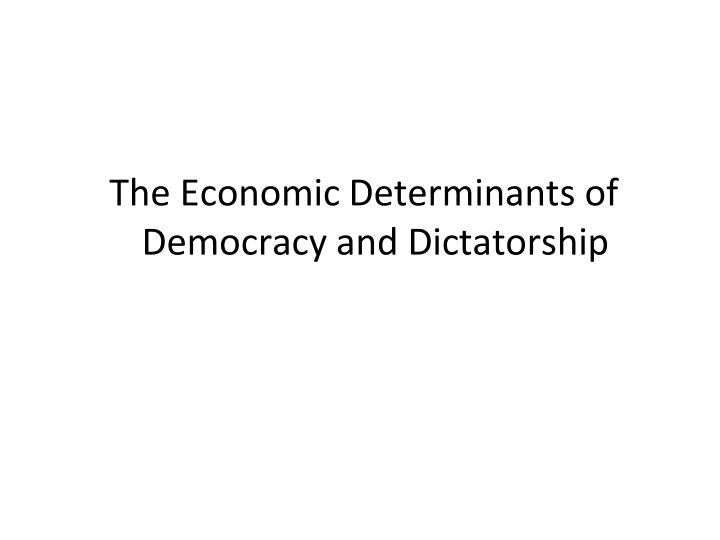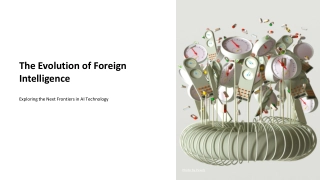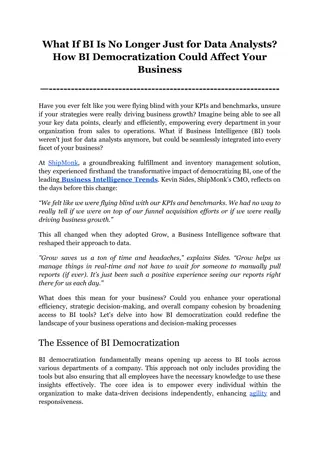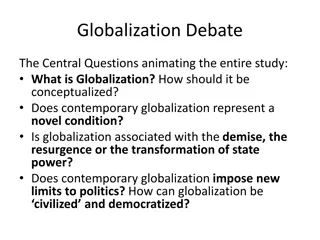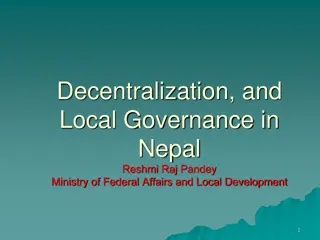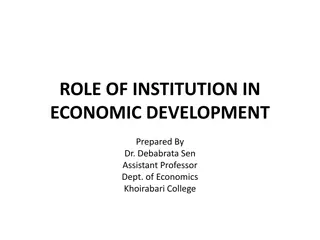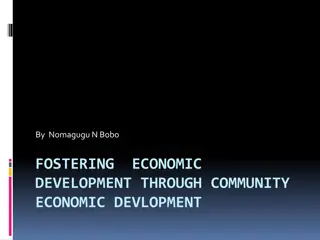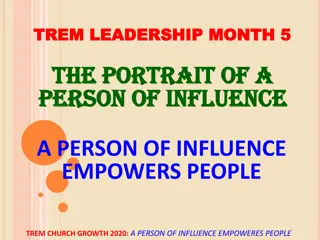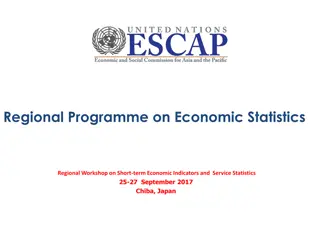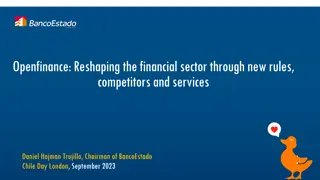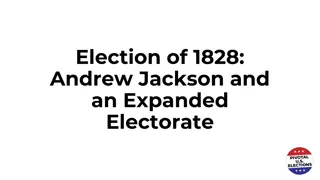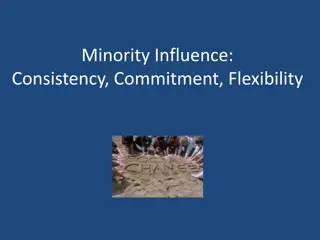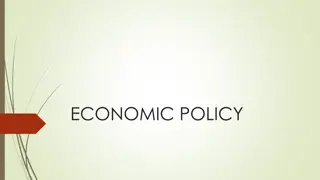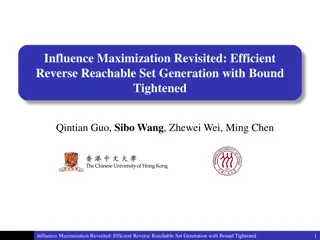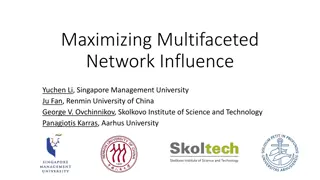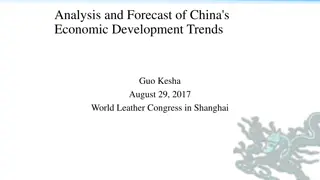The Influence of Economic Development on Democratization
Economic development plays a crucial role in the democratization process, as societies transition through different stages of economic growth. Modernization theory suggests that as societies develop economically, rulers are more inclined to seek the consent of the people, leading to the emergence and survival of democracy. While not a strict requirement, higher levels of economic development typically correlate with the presence of more inclusive modern democracies.
Download Presentation

Please find below an Image/Link to download the presentation.
The content on the website is provided AS IS for your information and personal use only. It may not be sold, licensed, or shared on other websites without obtaining consent from the author.If you encounter any issues during the download, it is possible that the publisher has removed the file from their server.
You are allowed to download the files provided on this website for personal or commercial use, subject to the condition that they are used lawfully. All files are the property of their respective owners.
The content on the website is provided AS IS for your information and personal use only. It may not be sold, licensed, or shared on other websites without obtaining consent from the author.
E N D
Presentation Transcript
The Economic Determinants of Democracy and Dictatorship
How does economic development influence the democratization process?
Most economic explanations for democracy can be linked to a paradigm called modernization theory. Modernization theory argues that all societies pass through the same historical stages of economic development.
Modernization Theory Underdeveloped Country Developed Country Large Agriculture Sector Small Agriculture Sector Small Industrial Sector Large Industrial Sector Small Service Sector Large Service Sector
Modernization theorists in political science argue that political change often accompanies economic development. Underdeveloped Country Developed Country Large Agriculture Sector Small Agriculture Sector Small Industrial Sector Large Industrial Sector Small Service Sector Large Service Sector Dictatorship Democracy
Dictatorial rule and predatory behavior will be common in underdeveloped agrarian societies. But as societies develop, the balance of power between the ruler and the people can change.
Economic development, and the societal transformation it produces, makes it more likely that rulers will need to bargain with, and seek the consent of, the people to govern. In this way, economic development promotes the emergence and survival of democracy.
Modernization theory doesnt say that economic development is necessary for democracy. Systems in which rulers seek the consent of the people to govern can exist in societies with low levels of economic development. Example: Early democracy. What it does say is that democracy, especially the more inclusive modern democracy, is more likely as societies develop economically.
Agrarian states are likely to be characterized by dictatorial rule and predatory behavior on the part of state elites. People who work the land often lack valuable exit options. As a result, rulers can appropriate crops and hence the revenue they require to stay in power without having to bargain with the people or seek their consent.
Economic development can change the balance of power between the ruler and the people by increasing the value of people s exit options. Fewer people are tied to the land, and some begin to obtain financial, educational, and other assets that are more mobile and less legible to the state. It becomes harder for state elites to monitor the economic activity of these people and appropriate their assets without their cooperation.
If rulers are dependent on these people, they may feel they have to bargain with them and seek their consent in order to access the revenue they need to stay in power. Institutions like assemblies facilitate this process by providing a convenient location for information gathering and bargaining. When granted power, such institutions also make it harder for rulers to renege on any negotiated agreement that s reached.
The result is a political system in which some people are able to constrain the behavior of the ruler and other state elites. The inclusiveness of the political system is expected to grow over time as economic development increases the number of people with mobile assets and, hence, credible exit options.
Modernization theory doesnt say that economic development always produces democracy. Certain conditions need to be met and even then, the relationship between economic development and democracy is probabilistic.
Two conditions are required for economic development to promote democracy: 1. The ruler must be dependent on the people. 2. Economic development must increase the value of people s exit options enough that dependent rulers feel compelled to seek their consent to govern.
One of the central implications of modernization theory is that there should be a strong positive relationship between economic development and democracy. Economic development is often operationalized in terms of a country s level of income. We often measure a country s level of income in terms of its GDP per capita.
Percentage of Democratic Country-Years by Income, 1950-2019 100 90 80 70 Percentage Democratic 60 50 40 30 20 10 $1,261 10 $1,975 20 $2,896 30 $4,112 40 $6,273 50 $8,961 $12,790 $19,588 $31,798 60 70 0 80 90 100 GDP Per Capita in 2017 PPP US Dollars (Grouped 5% Percentiles)
Income and Democracy in 2019 120,000 Luxembourg 110,000 Qatar Ireland 100,000 90,000 Singapore GDP per capita (2017 US dollars) 80,000 Switzerland 70,000 United Arab Emirates United States Norway 60,000 Iceland Austria Australia Taiwan Denmark Germany Belgium Finland France Kuwait Malta United Kingdom Saudi Arabia 50,000 Bahrain Italy New Israel Czechia Slovenia Lithuania 40,000 Cyprus Zealand Estonia Hungary Poland Portugal Greece Slovakia 30,000 Oman Russia Turkmenistan Kazakhstan Chile Uruguay Costa Rica Equatorial Guinea Belarus 20,000 China Armenia Peru Tunisia Jamaica Cape Verde Senegal Burkina Faso 10,000 Ghana S o Tom 0 0.1 0.2 0.3 0.8 0.9 1 0.4 0.5 0.6 0.7 V-Dem Measure of Democracy
Does this empirical pattern support modernization theory? Modernization theory predicts that economic development promotes both the emergence and survival of democracy. But we could find the same empirical pattern we ve just seen if economic development only helped democratic survival.
Why might increased income help democratic survival? Suppose you re a rich person living in a democracy. Autocracy is a big gamble. Suppose you re a poor person living in a democracy. Autocracy is less of a gamble.
Probability of Transitions to Democracy and Dictatorship by Income, 1950-2019 0.06 Probability of a Regime Transition 0.05 0.04 0.03 0.02 0.01 0 10 20 30 40 50 60 70 80 90 100 GDP Per Capita in 2017 PPP US Dollars (Grouped 10% Percentiles) Transition to Dictatorship Transition to Democracy
Income and Democratic Survival Strong evidence that higher income helps democratic survival. No democracy with an income above $15,869 in 2017 PPP US dollars has ever collapsed into dictatorship. About 61% of the world s democracies in 2019 had income levels above this threshold.
Income and Democratic Emergence Weaker evidence that higher income helps democratic emergence. While studies find little evidence that higher income promotes democratic emergence in the post-1950 period, they do find evidence if we look over a longer period of time. No dictatorship with an income above $28,233 in 2017 PPP US dollars has ever become democratic.
Income and Democracy in 2019 120,000 Luxembourg 110,000 Qatar Ireland 100,000 90,000 Singapore GDP per capita (2017 US dollars) 80,000 Switzerland 70,000 United Arab Emirates United States Norway 60,000 Iceland Austria Australia Taiwan Denmark Germany Belgium Finland France New Cyprus Zealand Estonia Portugal Kuwait Malta United Kingdom Saudi Arabia 50,000 Bahrain CzechiaItaly Slovenia Lithuania Slovakia Israel 40,000 Hungary Poland 30,000 Oman Greece Russia Turkmenistan Kazakhstan Chile Uruguay Costa Rica Equatorial Guinea Belarus 20,000 China Armenia Peru Tunisia Jamaica Cape Verde Senegal Burkina Faso 10,000 Ghana S o Tom 0 0.1 0.2 0.3 0.8 0.9 1 0.4 0.5 0.6 0.7 V-Dem Measure of Democracy
Rising income doesnt really capture the causal story linking economic development to democracy that we started with. Our story was more about how the changes in the socioeconomic structure of a country accompanying economic development alter the balance of power between the ruler and the people.
Economic development is expected to increase the number of people with mobile assets and hence valuable exit options. Rulers who find themselves dependent on these people are forced to bargain with them and seek their consent in order to access the revenue they need to stay in power. If the ruler becomes dependent on enough people with valuable exit options, the state takes on the features of modern democracy.
According to modernization theory, all societies move through a series of stages. Specifically, we see a shift from a focus on agriculture to a focus on manufacturing and services. Some scholars have argued that these changes in early modern Europe played a crucial role in the creation of representative government in England. Why?
Structural changes in the economy produced a shift in economic power away from traditional agricultural elites who controlled easily observable assets to a rising class of wool producers, merchants, and financial intermediaries who controlled assets that were more difficult to observe. The key point is that the state can tax or predate only on those assets they can observe (or count).
The increased ability of the gentry to hide their assets from state predation changed the balance of power between modernizing social groups and the traditional seats of power such as the Crown. The Crown now had to negotiate with the new economic elites in order to extract revenue.
In return for paying their taxes, the economic elites demanded limits to state predation. This resulted in the supremacy of Parliament over the Crown. The Glorious Revolution of 1688.
But why bother to create or strengthen an institution like parliament?
One answer is that an assembly provides a convenient location in which societal actors can air their grievances and demands. It s a place where the ruler can efficiently gather important information about their subjects views on various issues and potential sources of resistance.
One answer is that an assembly provides a convenient location in which societal actors can air their grievances and demands. It s a place where the ruler can efficiently gather important information about their subjects views on various issues and potential sources of resistance. But assemblies can also help solve credible commitment problems.
A credible commitment or a time-inconsistency problem occurs when (1) an actor who makes a promise today may have an incentive to renege on that promise in the future and (2) power is in the hands of the actor who makes the promise and not in the hands of those expected to benefit from the promise. The establishment of a strong parliament is designed to solve a credible commitment problem by keeping power in the hands of the recipient of the promise. This is a form of power-sharing agreement.
The introduction of a more constrained state occurred earlier and more definitively in England than it did in France. This was because of the unique structure of the economy that early modernization had produced in England.
Exit, Voice, and Loyalty Game In the prehistory of the game, the Crown has confiscated the assets of a segment of the elite represented by Parliament.
The Parliamentarians have three options. 1. Exit: Disinvest from the economy. 2. Voice: Petition the Crown for protection against future confiscations in exchange for a promise to continue investing in the economy. 3. Loyal: Keep investing and paying taxes.
O1: Unconstrained state, stagnant economy E, 1 Exit: Disinvest Parliamentarians Loyalty: Invest O2: Unconstrained state, growing economy 0,1 + L Voice: Demand constraints Crown Ignore: Reject constraints Respond: Accept constraints Parliamentarians O3: Constrained state, growing economy 1 c, L Exit: Disinvest Loyalty: Invest O4: Unconstrained state, stagnant economy E c, 1 O5: Unconstrained state, growing economy 0 c , 1 + L
The Crown was dependent on economic elites for tax revenue in both England and France. However, economic development had given the English economic elites more mobile assets and hence more credible exit options than their French counterparts. This meant that the English Crown was forced to bargain with their economic elites whereas the French Crown was not.
Summary of Outcomes in the EVL Game Crown Is autonomous L <1 Is dependent L > 1 Parliamentarians Have a credible exit threat (mobile assets) E > 0 Poor dictatorship (unconstrained state, stagnant economy) Rich democracy (constrained state, growing economy) Have no credible exit threat (fixed assets) E < 0 Rich dictatorship (unconstrained state, growing economy) Rich dictatorship (unconstrained state, growing economy)
Representative government and a constrained state are more likely to emerge and survive when rulers depend on a segment of society that comprises people holding mobile assets. We often think of those people who have mobile assets as the middle class. The existence of a strong middle class is often viewed as a necessary condition for democracy.
A constrained state isnt necessarily equivalent to a modern democracy. The key feature of a constrained state is that the elites who control violence have their power checked by someone. But that check on power can be other elites or the masses. In the 1688 Glorious Revolution in England, the power of the Crown was constrained by other economic elites, not the masses.
Economic development, though, often increases the number of people in society with credible exit threats over time. One way in which it does this is by promoting the importance of education and making human capital an increasingly critical component in the production process. Thus, dependent governments become responsive to, and constrained by, larger and larger sections of society over time, and we see a shift towards modern democracy.
Two conditions are required for economic development to promote democracy: 1. The ruler must be dependent on the people. 2. Economic development must increase the value of people s exit options enough that dependent rulers feel compelled to seek their consent to govern.
Condition 1: Are Rulers Dependent? Natural resources and foreign aid influence the extent to which rulers are dependent on the people.
